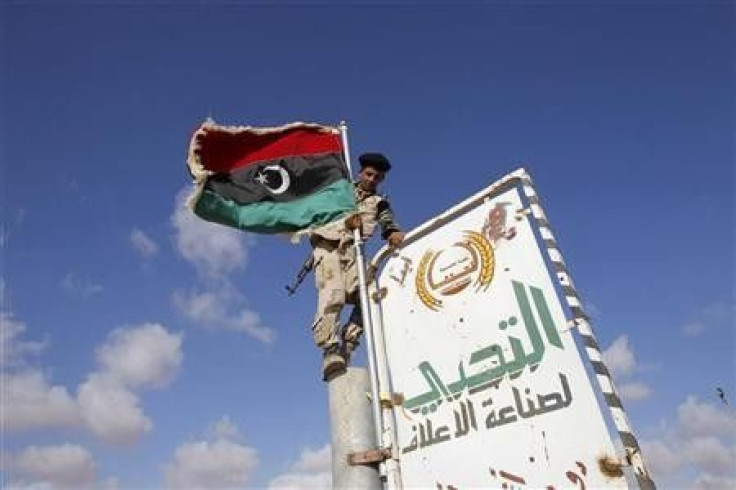Libya govt says its flag flies over Bani Walid

Libyan interim government forces said on Monday they had raised the country's new flag over Bani Walid, but it was not clear if they had captured the whole town, one of the last bastions of pro-Muammar Gaddafi loyalists.
Bani Walid and Gaddafi's home town, Sirte, are the only two towns in the country where there is still armed resistance to the rule of the National Transitional Council (NTC).
We have reached the city centre (of Bani Walid) and have raised the flag, Colonel Abdullah Naker, head of the Tripoli Revolutionist Council, told Reuters on Sunday.
Fighters taking part in the assault on Bani Walid also told Reuters they had entered the town, which is nestled into rocky hills some 150 km (90 miles) south of Tripoli.
Bani Walid is an ancestral home to the Warfalla, Libya's biggest tribe and one of its most politically influential. The Warfalla number about one million out of the country's six million population and were traditional supporters of Gaddafi.
The town has been under siege for weeks, with hundreds of Gaddafi loyalists dug into its steep valleys and hills resisting advancing interim government forces.
As well as ordering the military assault, NTC officials have been negotiating with tribal leaders inside Bani Walid for its surrender.
A group claiming to represent the people of the town offered a truce to Libya's new government on Monday. The tribal groups said they would pledge loyalty to the NTC and take over the town, but demanded in return the NTC withdraw its forces from the area and lift the siege.
It was not clear how the government would respond or whether NTC forces had already completely captured the town.
SIRTE FIGHTS ON
In Sirte, where Gaddafi loyalists have been under siege for weeks, there was little or no sign of the disorganised NTC forces making any progress on Monday and, amid chaos and confusion, in some places they had even been pushed back.
A doctor for the medical aid charity Medecins Sans Frontieres in Sirte has estimated 10,000 people remain trapped in the city of 75,000. Many are women and children, some are sick or injured.
NTC tanks and rockets bombarded a small area of central Sirte where they have boxed in the remaining Gaddafi loyalists. Libya's new leaders say they will only begin the transition to democracy after they capture the city.
Frustration is growing on the front line. Some fighters are irritated their commanders have not ordered a big push to take the rest of the city.
There is also anger between government forces from Misrata to the west and Benghazi to the east, who have accused each other of hitting their allies in friendly fire incidents.
What we are trying to do is to limit attacks from the east and west to avoid friendly fire, and instead attack from the south, said Mohammad Al Sabty, a field commander.
We have lost a lot of martyrs in recent days, said Mustafa Salim from a Misrata brigade. When Misrata units get close to Benghazi units it gets harder, he said. They fire at us and we fire at them.
Many NTC fighters abandon their positions at nightfall for more comfortable quarters further from the front line. That allows Gaddafi's men to infiltrate the lines during the night and fire at them, sometimes from behind.
Government forces captured 15 Gaddafi loyalist fighters on Monday, all of them black, a Reuters witness said. Gaddafi armed many sub-Saharan Africans to fight for him and black people have been subject to arbitrary reprisals by the NTC forces.
Some government fighters present tried to hit the newly captured prisoners, but were held back by more senior officers and the 15 men were marched off to the rear as NTC forces laid down suppressing fire at nearby snipers.
The new government's forces have been accused of mistreating prisoners and Amnesty International said in a report last week it was in danger of repeating some of the abuses of Gaddafi's rule, particularly through the use of arbitrary detention.
British Foreign Secretary William Hague said he would raise the issue at a meeting later in the day with the head of the NTC in Tripoli. It's very important they keep the moral authority by treating people well, Hague told reporters.
The often chaotic struggle for Sirte has killed scores of people, left thousands homeless and laid waste to much of what was once a showpiece Mediterranean city where Gaddafi entertained foreign leaders.
© Copyright Thomson Reuters 2024. All rights reserved.











